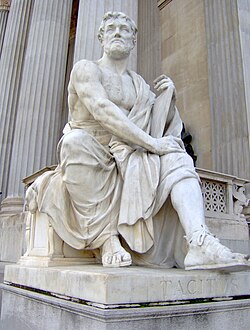
Back Tacitus Afrikaans Tacitus ALS Tacito AN تاسيتس Arabic تاسيتس ARZ Tácitu AST Publi Korneli Tasit Azerbaijani Публій Карнелій Тацыт Byelorussian Публий Корнелий Тацит Bulgarian কর্নেলিয়ুস তাকিতুস Bengali/Bangla
Cornelius Tacitus | |
|---|---|
 Statue of Tacitus outside the Austrian Parliament Building | |
| Born | c. AD 56 |
| Died | c. AD 120 (aged approx. 64) |
| Occupation(s) | Historian, politician |
| Years active | Silver Age of Latin |
| Academic background | |
| Influences | |
| Academic work | |
| Discipline | History |
| Main interests | History, biography, oratory |
| Notable works | Agricola Annals Dialogus de oratoribus Germania Histories |
Publius Cornelius Tacitus,[note 1] known simply as Tacitus (/ˈtæsɪtəs/ TAS-it-əs,[2][3] Latin: [ˈtakɪtʊs]; c. AD 56 – c. 120), was a Roman historian and politician. Tacitus is widely regarded as one of the greatest Roman historians by modern scholars.[4][5]
Tacitus’ two major historical works, Annals (Latin: Annales) and the Histories (Latin: Historiae), originally formed a continuous narrative of the Roman Empire from the death of Augustus (14 AD) to the end of Domitian’s reign (96 AD). The surviving portions of the Annals focus on the reigns of Tiberius, Claudius, Nero, and those who reigned in the Year of the Four Emperors (69 AD).[6]
Tacitus's other writings discuss oratory (in dialogue format, see Dialogus de oratoribus), Germania (in De origine et situ Germanorum), and the life of his father-in-law, Agricola (the general responsible for much of the Roman conquest of Britain), mainly focusing on his campaign in Britannia (De vita et moribus Iulii Agricolae). Tacitus's Histories offers insights into Roman attitudes towards Jews, descriptions of Jewish customs, and context for the First Jewish–Roman War. His Annals are of interest for providing an early account of the persecution of Christians and one of the earliest extra-Biblical references to the crucifixion of Jesus.
- ^ Birley 2000, p. 232.
- ^ "Tacitus". Merriam-Webster.com Dictionary. Merriam-Webster.
- ^ Longman, J.C. (2008). Longman Pronunciation Dictionary (3 ed.). Pearson Education ESL. ISBN 978-1405881173.
- ^
Van Voorst, Robert; Evans, Craig A.; Chilton, Bruce (2000). "Tacitus: The Executed Christ". In Evans, Craig A.; Chilton, Bruce (eds.). Jesus Outside the New Testament: An Introduction to the Ancient Evidence Studying the Historical Jesus. Grand Rapids, Michigan: Wm. B. Eerdmans Publishing. p. 39. ISBN 9780802843685. Retrieved 7 June 2020.
Cornelius Tacitus is generally considered the greatest Roman historian [...].
- ^
Compare:
Ferguson, Everett (1987). "Literature and language". Backgrounds of Early Christianity (3 ed.). Grand Rapids, Michigan: William B. Eerdmans Publishing (published 2003). p. 116. ISBN 9780802822215. Retrieved 7 June 2020.
The Silver Age produced two outstanding historians. Cornelius Tacitus (c. A.D. 55-120), through his Histories and the Annals, is the major source for the history of the empire in the first century.
- ^ Brodribb, William Jackson; Godley, Alfred Denis (1911). . In Chisholm, Hugh (ed.). Encyclopædia Britannica. Vol. 26 (11th ed.). Cambridge University Press. pp. 345–46.
Cite error: There are <ref group=note> tags on this page, but the references will not show without a {{reflist|group=note}} template (see the help page).